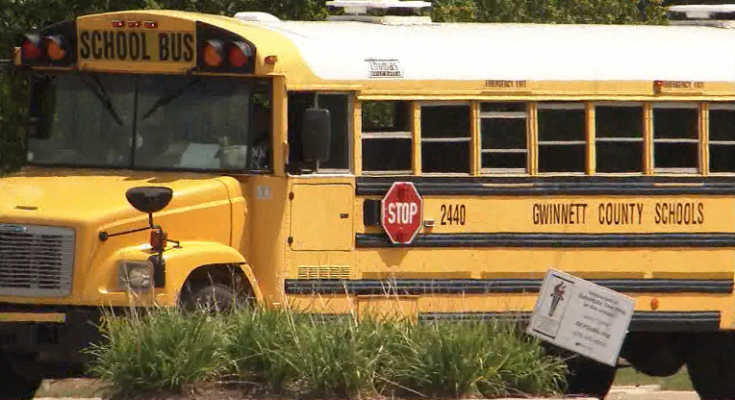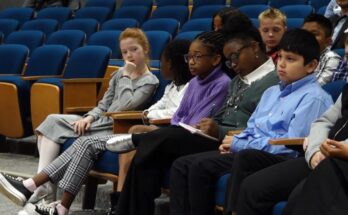By Katie Shepherd
Paul Adamus, 7, climbs the stairs of a bus before the first day of school on Aug. 3 in Dallas, Ga. Adamus is among tens of thousands of students in Georgia and across the nation who were set to resume in-person school Monday for the first time since March.
On Wednesday, teachers in Georgia’s largest school district returned to elementary, middle and high school campuses to start in-person planning for the fall semester.
By the next day, 260 district employees had been barred from entering their schools, either because they tested positive for the coronavirus or had been directly exposed to someone who had.
Sloan Roach, spokeswoman for Gwinnett County Public Schools, which serves more than 180,000 students, told the Atlanta Journal-Constitution that most of the cases were tied to community spread, rather than being spread at the schools. Some of the employees who reported exposure to the virus had not come to work yet, Roach added.
“Given the number of [covid-19] cases in Gwinnett, we would expect to see positives among our employees based on the community spread in our county,” Roach told the newspaper.
The outbreak has complicated the return to school in Gwinnett County, which this week had the highest number of new coronavirus cases in the state. Georgia has reported 195,435 cases and 3,842 deaths to date. But Gwinnett County’s teachers and school administrators are hardly alone in dealing with the fallout of an early outbreak as they try to launch a digital-only return.
Coronavirus infected at least 260 children and staffers at a sleep-away summer camp in Georgia last month, according to a report published by the Centers for Disease Control and Prevention last week.
On Thursday, the first day back for students at a middle school in Greenfield, Ind., a student who came to classes tested positive.
Within the first week of reopening, a school district in Mississippi reported its first positive case and identified 14 other students who came in contact with the sick pupil. By Monday, two more students had tested positive, the district said on Facebook.
After attending a three-day retreat to plan the upcoming school year, 11 school leaders who serve campuses in Chanute, Kan., tested positive for the virus by Monday.
Across the nation, school districts have been struggling to find the safest, most effective way to return to class this fall. But spiking coronavirus case rates, particularly in the Midwest and South, where outbreaks have been growing rapidly in recent weeks, have complicated the reopening process.
States and individual districts have adopted a patchwork of policies governing how schools should shut down when outbreaks spread through classrooms.
In Mississippi, the health department suggests closing a school if three classrooms, sports teams or clubs experience outbreaks at the same time. Schools in New York City will only reopen for in-person instruction if the city’s positive test rate remains lower than 3 percent, and if two students in different classrooms test positive, their school will shut down. California is allowing schools to reopen as long as their county hasn’t been on the state’s watch list for two weeks and will require schools to close only if more than 5 percent of students and staff test positive within a 14-day period.
Texas is forcing schools to reopen with at least some form of in-person instruction within two months of the state’s typical start date or risk forfeiting funds. Florida also required all of its schools to reopen classrooms this fall, but will allow parents of students to opt for online learning if they want.
Georgia has left control over closures up to school districts.
As scores of employees at Gwinnett County Public Schools tested positive in the last week, hundreds of teachers reportedly reached out to the Atlanta Constitution-Journal to share their experiences during the first week back on campuses.
At least one teacher quit her job at Gwinnett Elementary School because she had no option to work from home, even though her district is starting the school year with virtual classes.
“Back in April teachers were considered heroes,” Ashley Newman told WAGA-TV after she decided to leave her job. “But that messaging has changed. Now if you’re not willing to risk your life by going into a building unnecessarily then you’re lazy.”
Click here to view original web page at www.washingtonpost.com





